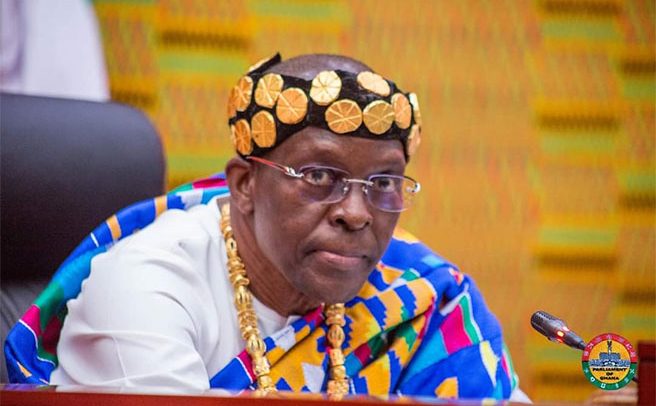Alban Bagbin
The Supreme Court has provided extensive reasons why it overturned the decision of the Speaker of Parliament, Alban Bagbin, to declare four seats in Parliament vacant.
The majority decision of the court held that the interpretation placed on Article 97(1)(g) and (h) by the Speaker in declaring the four seats vacant, was inconsistent with the true meaning and import of the constitutional provision.
They hold that an MP can only vacate his seat if he changes his political party and seeks to remain in Parliament under his new political identity, but not because he has declared intension to contest in a future election on a different ticket.
It said given the legal evaluation necessary for a ruling of the nature delivered by the Speaker, it is the High Court which is constitutionally empowered to make such a declaration pursuant to Article 99, and
definitely not the Speaker.
The majority decision also held that the constitutional language should be construed holistically and purposively, without imposing limitations that would curtail the fundamental freedoms of sitting MPs and ultimately sabotage the rights of the electorate.
Overturn
The Supreme Court on November 12, 2024, upheld a suit filed by Majority Leader Alexander Afenyo-Markin challenging the decision of the Speaker on ground that it contravenes Article 97(1)(g) and (h) of the 1992 Constitution.
His suit which sought interpretation of the constitutional article had contended that the Speaker misinterpreted the provision which formed basis for his decision to declare the four seats vacant.
Chief Justices Gertrude Torkornoo, Justices Mariama Owusu, Samuel Asiedu, Ernest Gaewu, and Yaw Asare Darko formed the majority while Justices Avril Lovelace Johnson and Issifu Omoro Amadu Tanko dissented on ground of jurisdiction.
Majority Decision
The Majority decision authored by Justice Yaw Darko Asare pointed out that if the suit was solely to determine issue of declaring a seat vacant in Parliament, it would not have garnered any intervention by the court.
However, it said the Speaker went ahead to take a decision two days after the filing of the suit and declare the seats vacant based on his interpretation of Article 97(1)(g) and (h), a decision which was later brought before the court for stay of execution pending interpretation of the constitutional provisions.
The court said the dispute in issue arises solely from what the proper interpretation and application of Article 97(1)(g) and (h) is to the fate of the four MPs filing nominations to contest the next elections as independents or on tickets of political parties that they do not currently represent.
This, it says, gives the Supreme Court the only court with jurisdiction to interpret the 1992 Constitution.
Life of Parliament
The Majority decision noted that those phrases appearing in Article 97(1)(g) and (h), inherently imply a contemporaneous action by an MP to switch allegiance to a different party while in Parliament and do not show any prospective or anticipatory connotation.
“Simply put, the language used in Article 97(1)(g) and (h), conveys present and immediate actions, reflecting immediacy and contemporaneity, rather than a prospective event or futuristic occurrence,” the court stated.
They hold that upon a true and proper interpretation of Article 97(1)(g), an MP must vacate his seat if he leaves the party under which he was elected, to join another party or become independent, and seeks to remain in Parliament under the new political status.
Similarly, with regards to Article 97(1)(h), they hold that an independent MP must vacate his seat, if he joins a political party in Parliament, and seeks to remain in Parliament under his new political status.
“Consequently, Article 97(1)(g) and (h) must be understood within their contextual framework, with no implicit or explicit indication that they pertain to future electoral aspirations or intentions that would materialise in subsequent terms, such as an MP contesting under a different ticket in the next election cycle.”
They added that Article 97(1)(g) & (h) of the Constitution is also concerned with actions that affect the numerical composition of the House of Parliament as presently constituted, aiming to avoid situations that disrupt parliamentary composition mid-term, altering its dynamics without voter input.
This, they say, underscores the provision’s distinct focus on maintaining parliamentary stability and respecting the proportional representation decided at the general election, rather than rigidly enforcing political loyalty.
“Hence filing nominations for a future election under a different party affiliation, does not fall within the law’s scope, given its non-disruptive nature to the current parliament’s composition,” they added.
Concurring Opinion
Justice Samuel Asiedu, in a concurring opinion, also held that actions of Parliament are subject to the constitutional yardstick, while concluding that the Speaker was wrong in declaring those four seats vacant simply because the MPs had declared an intention to contest an upcoming election on tickets other than those on which they were elected to this current Parliament.
Dissenting Opinion
Justice Avril Lovelace Johnson and Omoro Tanko Amadu, in their dissenting views, held that Mr. Afenyo-Markin failed to properly invoke the jurisdiction of the Supreme Court and should have gone to the High Court, and therefore dismissed his case.
BY Gibril Abdul Razak


